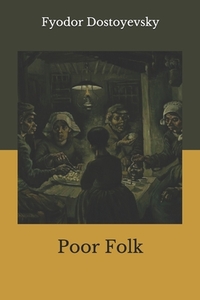You need to sign in or sign up before continuing.
Take a photo of a barcode or cover
Dostoevsky is one of my favorite authors but this was my least favorite of all his books I’ve read. Too wordy and little plot.
dark
emotional
reflective
sad
medium-paced
Plot or Character Driven:
Character
Strong character development:
Complicated
Loveable characters:
Yes
Diverse cast of characters:
N/A
Flaws of characters a main focus:
Complicated
کتابی سراسر غم و بدبختی و بیچارگی. انگار ناف شخصیتها را با بیچارگی بریدهاند. واقعاً چرا و چگونه نویسندگان میتوانند درد، سختی و بیچارگی را اینقدر زیبا به تصویر بکشند؟ شاید خودمان درد کشیده هستیم حتی اگر در گوشهی دیگری از این جهان هستی زندگی میکنیم.
شاید در این دوره و زمانه، کتابی با سبک نامهنگاری میان دو عاشق کمی حوصله آدم را سر ببرد ولی چون شرح حال و زندگیشان را به خواننده نشان میدهند جذاب است. همه جا پوشیده از بدبختی. بیچارگی از سر و روی کتاب و شخصیتها میبارد. اگر اندک خوشی و خوشبختی هم باشد، لحظهای بعد چنان با بیچارگی روبهرو میشوند آن سرش ناپیدا.
چنان از مرگ سخن به میان میآید که گویی خود بر بستر و بالای سر درگذشته ایستادهای و جان دادنش را میبینی؛ (رخدادی که برای من در واقعیت پیش آمد و تا چند روز درگیرش بودم.)
حتماً شنیدهاید که میگویند با آدم پولدار بگرد تا پولدار شوی و برعکس. داستایفسکی در این کتاب میگوید: "بدبختی یک بیماری واگیردار است. آدمهای بیچاره و بدبخت بایستی از هم دوری کنند تا بدبختیشان به هم سرایت نکند و بیشتر نشود." شاید آن حرف وام گرفته از این کتاب باشد. کسی چه میداند!
حس کردم در پایان کتاب، داستایفسکی پیامی به دیگران به ویژه خوانندگانش دارد، که کاری به سبک نداشته باشید: هیچوقت سبکم را اصلاح نمیکنم، من مینویسم فقط برای آنکه نوشته باشم، فقط برای آنکه هر قدر بیشتر به تو بنویسم.
پینوشت 1: بریدهای از کتاب: خاطرات، چه شیرین چه تلخ، همیشه منبع عذاب هستند؛ دستکم برای من که چنین است.
پینوشت 2: امان از داغ و درد نامهی پایانی کتاب؛ امان... تنها کافی است خودتان را جای ماکار آلکسییویچ بگذارید.
شاید در این دوره و زمانه، کتابی با سبک نامهنگاری میان دو عاشق کمی حوصله آدم را سر ببرد ولی چون شرح حال و زندگیشان را به خواننده نشان میدهند جذاب است. همه جا پوشیده از بدبختی. بیچارگی از سر و روی کتاب و شخصیتها میبارد. اگر اندک خوشی و خوشبختی هم باشد، لحظهای بعد چنان با بیچارگی روبهرو میشوند آن سرش ناپیدا.
چنان از مرگ سخن به میان میآید که گویی خود بر بستر و بالای سر درگذشته ایستادهای و جان دادنش را میبینی؛ (رخدادی که برای من در واقعیت پیش آمد و تا چند روز درگیرش بودم.)
حتماً شنیدهاید که میگویند با آدم پولدار بگرد تا پولدار شوی و برعکس. داستایفسکی در این کتاب میگوید: "بدبختی یک بیماری واگیردار است. آدمهای بیچاره و بدبخت بایستی از هم دوری کنند تا بدبختیشان به هم سرایت نکند و بیشتر نشود." شاید آن حرف وام گرفته از این کتاب باشد. کسی چه میداند!
حس کردم در پایان کتاب، داستایفسکی پیامی به دیگران به ویژه خوانندگانش دارد، که کاری به سبک نداشته باشید: هیچوقت سبکم را اصلاح نمیکنم، من مینویسم فقط برای آنکه نوشته باشم، فقط برای آنکه هر قدر بیشتر به تو بنویسم.
پینوشت 1: بریدهای از کتاب: خاطرات، چه شیرین چه تلخ، همیشه منبع عذاب هستند؛ دستکم برای من که چنین است.
پینوشت 2: امان از داغ و درد نامهی پایانی کتاب؛ امان... تنها کافی است خودتان را جای ماکار آلکسییویچ بگذارید.
dnf at 70%
least work from him. I'm not even mad at it I just accepted that his earlier works are not ✨ dostoevsky ✨ yet and it shows and it's ok kkk
least work from him. I'm not even mad at it I just accepted that his earlier works are not ✨ dostoevsky ✨ yet and it shows and it's ok kkk
کتاب به صورت مکاتبه دو نفر که در یک مکان زندگی می کنند نوشته شده.توصیفات فقر و بیچارگی انقدر خوب به تصویر کشیده شده که حس رو به خواننده کاملا منتقل میکنه.
و عاشق ادبیات الکسیویچ شدم.انسانی در فقر کامل که ادبیاتی بسیار دلنشین برای نامه نگاری داره.کلمات مامکم،کبوترکم و... در سراسر کتاب تکرار میشه.
و عاشق ادبیات الکسیویچ شدم.انسانی در فقر کامل که ادبیاتی بسیار دلنشین برای نامه نگاری داره.کلمات مامکم،کبوترکم و... در سراسر کتاب تکرار میشه.
challenging
emotional
reflective
sad
slow-paced
Plot or Character Driven:
Character
Strong character development:
No
Loveable characters:
N/A
Diverse cast of characters:
No
Flaws of characters a main focus:
Complicated
Some other reader has roasted the book pretty darn well by highlighting the underlying nonsense of struggling to make your ends meet, yet keeping giving money and help to someone else. She, the recipient, is very well aware that her relative and benefactor is too generous for his own good, yet he keeps giving, and she keeps on taking, and actually needing.
There is something both toxic and therapeutic in this exchange of letters and feelings (truth be told, many if not most toxic relationships do somehow feel like a cure, that's exactly the tricky thing about them). As countless others have written, this is not just yet the "Let's digress about God and Man and Love and Faith for 120 pages in a row" Fyodor Michajlovic, who was in his twenties when he came out with this first one work, but there's more of a nod to him already. There is, above all, a surgical sensibility towards the contradictions of the mind and the feelings, the constant pressure that derives from having to make tough choices and deal with unpleasant acquaintances, the relief found in mundane elements of beauty, stablilty, and human connections, and this is exactly what makes this rather pathetic, and may I say somewhat boring little novel so precious and relatable in these very times.
There is something both toxic and therapeutic in this exchange of letters and feelings (truth be told, many if not most toxic relationships do somehow feel like a cure, that's exactly the tricky thing about them). As countless others have written, this is not just yet the "Let's digress about God and Man and Love and Faith for 120 pages in a row" Fyodor Michajlovic, who was in his twenties when he came out with this first one work, but there's more of a nod to him already. There is, above all, a surgical sensibility towards the contradictions of the mind and the feelings, the constant pressure that derives from having to make tough choices and deal with unpleasant acquaintances, the relief found in mundane elements of beauty, stablilty, and human connections, and this is exactly what makes this rather pathetic, and may I say somewhat boring little novel so precious and relatable in these very times.
funny
lighthearted
reflective
medium-paced
Plot or Character Driven:
Character
Strong character development:
No
Loveable characters:
Complicated
Diverse cast of characters:
No
Flaws of characters a main focus:
Yes
Esta foi a primeira obra de Dostoyevsky e eu achei por bem, antes de avançar para os livros que mais interesse me despertam, começar pelo início e ler o livro com que tudo começou, apesar da premissa da história ser das que menos me cativa de todas as obras do autor.
E realmente esse pouco interesse acabou por ser comprovado ao longo da leitura. Esta forma de contar a história, com carta para a frente e carta para trás não é, de todo, o estilo de texto que mais gosto.
As duas personagens são pobres, vivem no mesmo complexo habitacional e trocam cartas entre si onde desabafam sobre os complicados dia-a-dias, as dificuldades por que passam e o sofrimento psicológico e físico que a falta de dinheiro e, consequentemente, respeito e dignidade, lhes provocam.
A obra até tem alguns momentos interessantes, mas acaba por se tornar aborrecida e demasiado dramática grande parte do tempo, com os "queixumes" das personagens a serem demasiado exagerados e negativistas. Na minha opinião as personagens são não só pobres financeiramente, mas de espírito também, de certa forma...
Tem o mérito de ter sido o primeiro, mas realmente percebe-se porque é que esta obra é considerada uma das mais fracas do autor.
E realmente esse pouco interesse acabou por ser comprovado ao longo da leitura. Esta forma de contar a história, com carta para a frente e carta para trás não é, de todo, o estilo de texto que mais gosto.
As duas personagens são pobres, vivem no mesmo complexo habitacional e trocam cartas entre si onde desabafam sobre os complicados dia-a-dias, as dificuldades por que passam e o sofrimento psicológico e físico que a falta de dinheiro e, consequentemente, respeito e dignidade, lhes provocam.
A obra até tem alguns momentos interessantes, mas acaba por se tornar aborrecida e demasiado dramática grande parte do tempo, com os "queixumes" das personagens a serem demasiado exagerados e negativistas. Na minha opinião as personagens são não só pobres financeiramente, mas de espírito também, de certa forma...
Tem o mérito de ter sido o primeiro, mas realmente percebe-se porque é que esta obra é considerada uma das mais fracas do autor.


